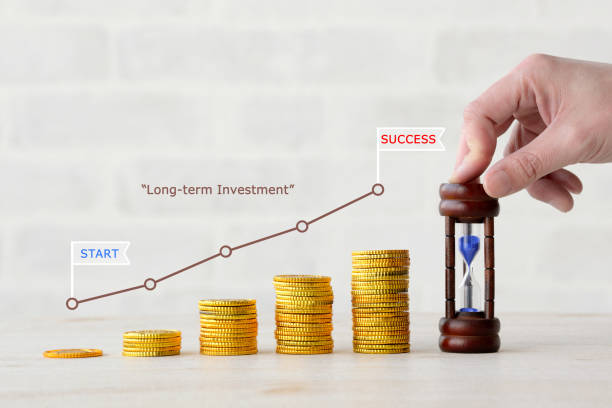Imagine a financial superpower that has the potential to transform even modest savings into substantial wealth over time. That superpower is compound interest, and it’s a force that can significantly impact your financial future. “The Power of Compound Interest: Why Early Investment Matters” is a journey into the world of finance where time and smart investment decisions combine to yield remarkable results.
At its core, compound interest is the concept of earning interest not only on your initial investment but also on the interest you’ve already earned. In essence, it’s interest on top of interest, creating a compounding effect that accelerates your wealth accumulation. The key to harnessing this power is to start early and stay committed to your investment strategy.
This guide will delve into the mechanics of compound interest, explaining how it works and why it’s a crucial factor in building long-term financial security. We’ll explore practical examples to illustrate the real-world impact of compounding on your investments, from retirement savings to wealth generation.
Furthermore, we’ll emphasize the importance of time in the equation. The earlier you start investing, the more time you give compound interest to work its magic. Whether you’re a young professional just beginning your career or someone looking to boost their retirement savings, understanding the role of time in compound interest is vital.

We’ll also discuss various investment options and strategies that can maximize the power of compound interest. From traditional investments like stocks and bonds to tax-advantaged accounts like IRAs and 401(k)s, you’ll learn how to tailor your investment approach to leverage the compounding effect.
“The Power of Compound Interest: Why Early Investment Matters” is your roadmap to unlocking the potential of this financial superpower. It’s a journey that underscores the value of starting early, staying committed, and making informed investment decisions. Whether your goals are short-term or long-term, understanding the power of compound interest is your first step toward a more financially secure future.
What is Compound Interest and How Does It Work?
Compound interest is often described as one of the most potent forces in the financial world, and for a good reason. At its core, compound interest is the process by which your money earns interest not only on the initial amount you invested or deposited but also on the interest that has already been earned. In essence, it’s interest on top of interest, and it has a snowball effect that can significantly boost your savings or investments over time.
The key concept behind compound interest is time. The longer your money is allowed to grow and compound, the more powerful its impact becomes. This is why early investment is often emphasized as a crucial wealth-building strategy. The sooner you start investing or saving, the more time your money has to take advantage of the compounding effect. Even small contributions made consistently over time can grow into substantial sums thanks to the magic of compounding.
To illustrate how compound interest works, consider a simple savings account example. Let’s say you deposit $10,000 in a savings account with an annual interest rate of 5%. In the first year, you earn $500 in interest (5% of $10,000). However, in the second year, you don’t just earn interest on your initial $10,000; you earn interest on the total amount, which is now $10,500. So, at a 5% interest rate, you earn $525 in the second year, not $500. This process continues, with each year’s interest calculated based on the growing total. Over time, your money grows faster and faster, thanks to the compounding effect.

Compound interest isn’t limited to savings accounts; it applies to various types of investments, including stocks, bonds, and retirement accounts. The reinvestment of dividends, interest, or capital gains in these investments can lead to substantial wealth accumulation. It’s crucial to understand that compound interest can work for you when you invest wisely and stay committed to your long-term financial goals. However, it can also work against you when you carry high-interest debts, as interest on outstanding balances can accumulate rapidly, making it essential to manage debt wisely to avoid financial setbacks.
In conclusion, compound interest is a financial concept that has the power to turn modest savings or investments into significant wealth over time. It’s driven by the reinvestment of earnings and time, making early investment and consistent contributions essential strategies for maximizing its benefits. Understanding how compound interest works is a fundamental step toward building a more secure financial future and achieving your long-term financial goals.
Why Early Investment Matters
Early investment is a financial strategy that can make an astonishing difference in your long-term financial well-being. The concept revolves around harnessing the power of compound interest, and it’s often referred to as the “time value of money.” Simply put, the earlier you begin investing or saving, the more time your money has to grow, and the greater the impact of compound interest becomes.
To grasp the significance of early investment, consider two hypothetical investors, Alice and Bob. Alice starts investing $5,000 per year at age 25 and continues until she’s 35, contributing for a total of 10 years. Bob, on the other hand, delays investing until he’s 35 and then contributes $5,000 per year for 30 years until he’s 65. Assuming both earn a consistent 7% annual return on their investments, who ends up with more money at age 65? Surprisingly, it’s Alice. Even though she invested for only 10 years compared to Bob’s 30, her early start allowed her investments to compound for a more extended period, resulting in a larger nest egg.
This example illustrates the crucial role of time in the power of compound interest. The longer your money is invested, the more it benefits from the compounding effect, which can significantly boost your savings or investments over time. Early investment doesn’t require large sums of money; even small contributions made consistently over time can grow into substantial wealth. It’s the time factor that magnifies the results.
Another reason early investment matters is the ability to weather market volatility. Financial markets can experience fluctuations and downturns, but with a long investment horizon, you have time to ride out these market cycles and recover from losses. On the other hand, individuals who delay investing until later in life may be more vulnerable to market downturns, as they have a shorter time frame to recoup losses.
Early investment also provides a sense of financial security and flexibility. It can help you achieve financial goals such as homeownership, funding education, or retiring comfortably. Having a financial cushion built through early investments can provide peace of mind and the freedom to pursue your aspirations and passions later in life.
In conclusion, early investment is a financial strategy that can be your greatest ally in building long-term wealth and achieving financial security. By starting early, you allow your money more time to grow through the power of compound interest. Even small contributions made consistently can result in substantial wealth over time. Early investment not only magnifies your financial potential but also provides resilience against market volatility and greater flexibility to pursue your life’s goals and dreams. It’s a strategy that empowers you to take control of your financial future and work toward a more prosperous and secure tomorrow.
How to Start Investing Early
Starting your investment journey early in life is a wise and proactive financial decision that can pave the way for a more secure and prosperous future. Whether you’re in your twenties, just beginning your career, or even a teenager with an interest in financial planning, here are some practical steps to help you get started on the path to early investing.
Investing for Retirement: Strategies to Secure Your Financial Future.
Set Clear Financial Goals: Begin by defining your financial objectives. What are you investing for? Is it retirement, buying a home, funding your child’s education, or simply building wealth? Having clear goals will provide direction and motivation for your investment strategy.
Assess Your Risk Tolerance: Understand your willingness and capacity to take on risk. Your risk tolerance should align with your investment goals and your ability to withstand market fluctuations. Younger investors typically have a longer time horizon, allowing them to tolerate more risk in pursuit of potentially higher returns.
Create a Budget: Establish a budget that outlines your income, expenses, and savings goals. A budget helps you identify how much you can allocate to investments each month. Consistency in contributing to your investments is key to harnessing the power of compound interest.
Build an Emergency Fund: Before diving into investments, ensure you have an emergency fund in place. This fund should cover three to six months’ worth of living expenses and provide a financial safety net in case of unexpected events.
Educate Yourself: Take the time to educate yourself about various investment options, such as stocks, bonds, mutual funds, and exchange-traded funds (ETFs). Understand the risks and potential returns associated with each asset class.
Open an Investment Account: Choose a brokerage or investment platform that suits your needs. Many online platforms offer user-friendly interfaces and low fees, making it easy for beginners to start investing.
Start Small: You don’t need a large sum of money to begin investing. Many investment platforms allow you to start with minimal amounts. Consistency in contributing, even if it’s a small monthly sum, can lead to significant growth over time.

Diversify Your Portfolio: Diversification is a key principle of investing. Spread your investments across different asset classes and industries to reduce risk. A well-diversified portfolio can help protect your investments from market downturns.
Take Advantage of Tax-Advantaged Accounts: Explore tax-advantaged accounts like Individual Retirement Accounts (IRAs) or workplace retirement plans like 401(k)s. These accounts offer tax benefits and can help you save more efficiently for retirement.
Stay Informed and Adapt: Keep yourself informed about market trends, economic developments, and changes in your investment portfolio. Be prepared to adapt your strategy as your financial goals evolve.
Seek Professional Guidance: Consider consulting a financial advisor or planner, especially as your investments grow and become more complex. Professional advice can help you make informed decisions and optimize your investment strategy.
In conclusion, starting to invest early in life is a smart financial move that can have a profound impact on your financial future. With discipline, education, and a well-thought-out strategy, you can lay the foundation for long-term wealth accumulation, financial security, and the realization of your life goals. Remember that investing is a journey, and the earlier you start, the more time you have to enjoy the benefits of compound interest and financial growth.
Common Investment Mistakes to Avoid
Avoiding common investment mistakes is crucial for securing your financial future and achieving your long-term goals. One of the most prevalent errors is letting emotions drive investment decisions. Emotional reactions to market fluctuations, such as panic selling during a downturn or overzealous buying during a rally, can lead to poor timing and suboptimal outcomes. Successful investors maintain a disciplined, rational approach, focusing on long-term goals rather than short-term market movements.
Another mistake is the lack of diversification. Concentrating investments in a single asset class or putting all your money into a specific industry or company can expose your portfolio to unnecessary risk. Diversification, the practice of spreading investments across various assets, industries, and geographic regions, is essential for mitigating risk and achieving a balanced, well-rounded portfolio.
Ignoring research and due diligence is a common pitfall. Investing without thoroughly understanding the assets in your portfolio can lead to unexpected losses. Conducting proper research involves studying an investment’s fundamentals, historical performance, and potential risks and rewards. Whether you’re investing in individual stocks, mutual funds, or other assets, knowledge is key to making informed choices.
Attempting to time the market is another prevalent mistake. Predicting short-term market movements is notoriously difficult, and frequent trading can lead to higher costs and reduced returns due to transaction fees and taxes. It’s often more effective to adopt a long-term perspective and stay invested rather than trying to time market highs and lows.

Overlooking the impact of fees and expenses is a mistake that can erode investment returns over time. Fees associated with investments, such as management fees, trading costs, and taxes, can significantly impact your overall returns. It’s crucial to be aware of these costs and choose investments with expense ratios that align with your financial goals.
Lastly, a lack of a well-defined investment plan is a common error. Investing without a clear strategy can result in aimless decisions and inconsistency. An investment plan should outline your goals, risk tolerance, asset allocation, and a systematic approach to managing your portfolio over time. Having a plan in place can help you stay on course and avoid impulsive decisions driven by market volatility or external influences.
Conclusion
“The Power of Compound Interest: Why Early Investment Matters” has illuminated the profound impact that this financial concept can have on your long-term financial well-being. It’s a reminder that time is one of your most valuable assets when it comes to building wealth. Starting your investment journey early, even with modest contributions, allows you to harness the full potential of compound interest.
The examples presented throughout this exploration of compound interest demonstrate how an early start can lead to substantial financial growth over time. Whether you’re saving for retirement, funding education, or pursuing other financial goals, understanding the power of compound interest empowers you to make informed decisions that align with your aspirations.
As you embark on your financial journey, remember that consistency and discipline are key. Establishing a regular savings or investment habit and staying committed to your long-term objectives can amplify the benefits of compounding.
Moreover, compound interest isn’t just a theoretical concept; it’s a financial superpower that has the potential to transform your financial future. By embracing early investment and making prudent financial choices, you can work toward a more secure and prosperous tomorrow. The time to start is now, and the benefits of compounding are within your reach, ready to shape your financial destiny.








